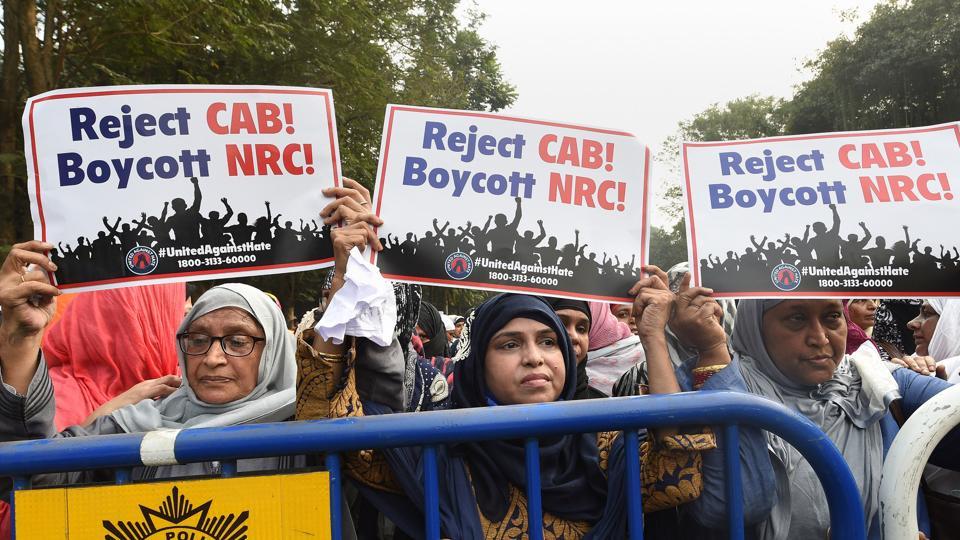
Beleaguered Mamata in a spot as citizenship Act protests singe Bengal
West Bengal singed over the new citizenship law for the second consecutive day on Saturday, with protestors burning down trains, buses and a fire tender in separate incidents.

West Bengal singed over the new citizenship law for the second consecutive day on Saturday (December 14), with protesters burning down trains, buses and a fire tender in separate incidents.
The development has put the Trinamool Congress government in the state in a tight spot considering that the ruling party itself is a vehement critic of the new legislation and favours an agitation against the law.
Five trains, standing at Krishnapur railway station in Murshidabad districts, were set on fire by protesters in the evening. There was, however, no report of any casualties so far.
Spontaneous protests, mainly by minority groups, against the amended Citizenship Act also crippled the state’s economic lifeline, the Kona Expressway in Howrah. At least five buses were either set on fire or vandalized. A fire tender was also gutted.
The protesters fought pitched battle with police, pelting stones at them, when the law enforcers tried to evict them from the expressway. Several rounds of baton charge and firing of tear gas shells proved futile in bringing the situation under control till late afternoon.
Rail communications on many routes in South-Eastern Railways too were disrupted as agitators squatted on the tracks in several districts.
Also read | Citizenship Act protest hits ONGC, OIL plants in Assam, fuel supply
The spiraling violence came as a double whammy for the state’s ruling dispensation, as the enactment of the controversial law is viewed even within the Trinamool Congress as a political setback for the party.
Armed with the new legislation, the BJP and the Rashtriya Swayamsevak Sangh (RSS), the saffron party’s ideological fountainhead, have decided to launch a massive “citizenship outreach drive” in the state.
BJP state president Dilip Ghosh said booklets and leaflets would be distributed among the public to make them aware of the various aspect of the new law and how it would benefits Bengali Hindu migrants, particularly the Matuas. The politically-influential community is consisting largely of Namasudra Dalit immigrants.
The challenge before chief minister Mamata Banerjee is to balance her contesting responsibilities as an administrator and a politician.
If the violence further escalates, it will seriously dent her credibility, more so as she also holds the home portfolio. Worst, the spontaneous people’s stir if not handled properly, could even spiral into communal clashes further polarising the situation, giving the BJP another shot in the arm.
Ghosh in a provocative statement said the ongoing violence in the state is rekindling the memory of the “great Calcutta killings of 1946.” He was referring to August 16, 1946 — the day the city witnessed its worst rioting between Hindus and Muslims.
He further claimed that the protesters were “illegal immigrants, who loot votes for the TMC,” in an oblique reference to Bengali-speaking Muslims.
The dilemma before Banerjee is to quell violence, without hurting minority sentiments. She needs to ensure that the agitations, without any leadership, do not go berserk and take communal colour.
“Any communal violence will not only polarize Hindu votes in favour of the BJP, but it will also lead to shifting of minority votes from the TMC to any fundamentalist outfit,” said senior journalist Nirmalya Banerjee, who suspects there are some agent provocateurs behind the current spate of violence in the state.
Also read | Road, rail blockade in Bengal as protests against Citizenship law continue
Asaduddin Owaisi’s All India Majlis-e-Ittehad-ul-Muslimeen (AIMIM) has already made its foray into the state politics and is trying hard to woo away minorities from the TMC fold. The state has over 24.6 million Muslims, who form 27.01 percent of its population as per 2011 census report.
In the current scenario, Banerjee could not be overtly seen as going too soft towards the protesters from minority community, lest it would further alienate the Matuas.
She though warned that stern action would be taken against those indulging in violence, on the ground there is no sign of any sternness.
To wriggle out of the tight spot, Banerjee chose to hit the streets herself to protest against the Citizenship Act as well as the National Register of Citizens (NRC), the “twin devils” as she called them.
The party, under her directive, lined up three consecutive protest marches in Kolkata from Monday.
Also read | Shinzo Abe’s visit to India postponed amid rising violence in Assam
A TMC leader said, by launching the agitation, didi (the elder sisters), as Banerjee is fondly referred by her workers and supporters irrespective of their ages, would take over the leadership of the agitation against the citizenship law and the register.
“The mass movement under her leadership will be peaceful and democratic,” he said.
In the process she would possibly be able to avert a communal flare up.
As for the Matuas, the TMC has been assuring them that since the state government would not allow the NRC in the state, there would not be any threat to their stay in the state.
“We have already acquired citizenship. We are taking part in elections, doing government jobs, getting benefits of government schemes. Members of our community have become ministers and MPs. What more the new legislation will give us,” a TMC leader from the Matua community was hard telling a paltry group of youth from his community in Nadia, a day after the Citizenship Amendment Bill was cleared by the Rajya Sabha.
The TMC hopes Matuas buy that argument, a proposition that the BJP would try its best to thwart.

